Summer Attractions
Boy meets girl—and what happens thereafter is their personal version of life’s most magical feeling. . . Hollywood is pretty special to itself in most things—but not one bit special when it comes to love. The good old summertime works its spell in Hollywood just as it does every other place. Hands clasp, lips kiss, eyes look deep into eyes with the same sweet fervor that is being expressed the world around, as a moon rides through an evening sky.
Joyce Holden and Dok Stanford are the love-at-first-sight couple, for instance, for whom after their first meeting there has been only one thought: how soon can we afford to marry? By contrast, Ann Blyth and Dick Clayton are that boy-and-girl-next-door pair whom you must have, in duplicate, in your town, since their type is everywhere.
It isn’t love yet for Piper Laurie and Dick Anderson but is it exciting—and it all started at Photoplay’s Gold Medal dinner! As for Anne Francis and her nice college man, Bam Price—well, this is the country club, this is the merriest, this is the red shoes climbing up the golden stairs to cloud seven all the time.
And just in case any of you readers haven’t found your own private swoon for June, we got each of these fellows to tell exactly why his chosen doll scores such a high date rating. Check your own score against these scores and if you come out less than sixty per cent, get with it, sister!
Dok Stanford, talking of Joyce Holden, is the most poetic of our men, maybe because Dok is a writer by profession and, therefore, used to making with the words. Ask this guy why his girl, above all the others he has met, makes his pulse race, his brain teem, his ambition soar and he eulogizes, “I love Joyce. How else can a guy say it? For me, she’s a combination of everything I hoped to find in a woman. She’s intelligent—so we have discussions. She’s zany—so we have laughs. She’s completely natural and honest—so there’s never any pretense. We see eye to eye on most things. We love life, people and our work—most of all each other.”
Joyce and Dok met on a blind date set up by Donald O’Connor—except that Dok had both eyes wide open. What had opened them was his first sight of Joyce in her first picture, “The Milkman” in which she co-starred with Donald. Joyce, barely eighteen, made Dok think of all the lovely things of spring. He nicknamed her “Jonquil,” at once, and still calls her by that pretty pet name.
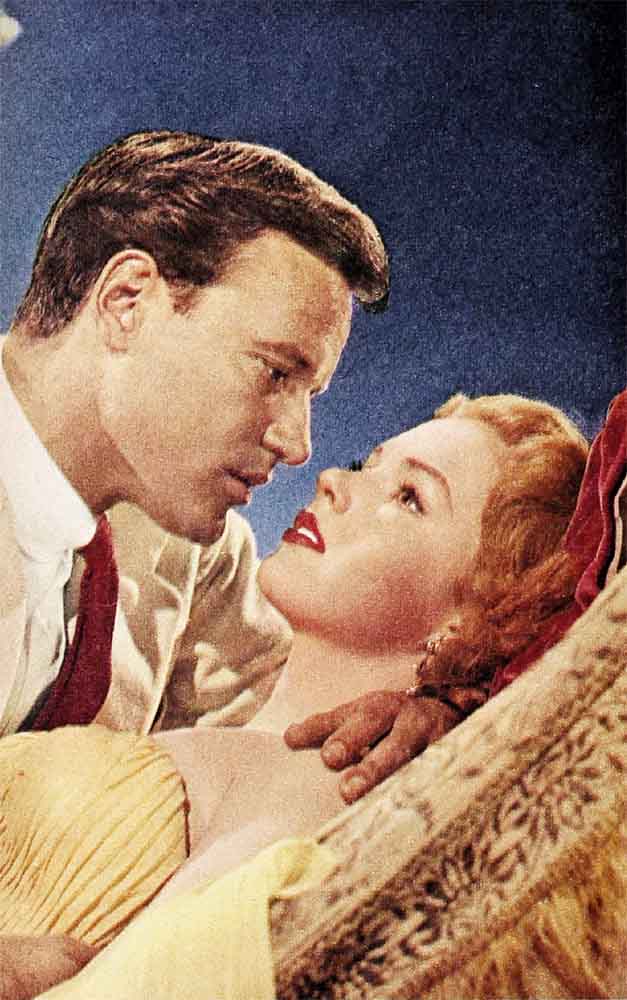
They went steady from that meeting onward—and one reason, undoubtedly, was that Joyce on their first date “alone together” didn’t pull the boner so many girls do. She didn’t demand a big, expensive date. Sure, Dok’s a good writer—and when he sells a yarn to pictures, as he often does, it’s all caviar and champagne. But when he doesn’t, it’s more often just chili and beans. Joyce, who grew up in the theatre, knows all about uncertain incomes.
What made Dok endearing to her was that he, having been around Hollywood and being about eight years her senior, was smart enough to know that, despite her contract with U-I, she wasn’t within miles of rolling in wealth either. Thus they had dates at hamburger stands or picnics on the beach, or brunch at her apartment or his—for laughs, and listening to new platters, and talking shop.
Things went along so fast with Joyce and Dok that they couldn’t bear separations. She made “Bronco Buster,” and U-I sent her East on a personal-appearance tour. The studio paid her bills, naturally. Dok couldn’t afford the trip but he couldn’t endure not seeing her. So, two days after she’d left, he followed her in his car, driving like mad, all the way across the country, just to be with her for a couple of days.
Actually this trip of Dok’s came close to creating a crisis. Dok said he’d call Joyce at Delmonico’s, the swanky New York hotel where she was staying, the moment he arrived. But meanwhile, U-I had her booked solidly on a series of appointments with interviewers, editors, photographers and the like.
All day during the day Joyce expected Dok, she kept phoning the hotel. “My messages,” she’d say. But never was that one right name among them. Finally, at six, when she had done all the things that were expected of her as a rising young star, she made up her unhappy mind to go to the theatre, all alone. Anything would be better than being alone in her hotel having the meemies.
She headed back to Delmonico’s, just to change her clothes and powder her perfect little nose. And there in the lobby was Dok, pacing up and down. They fell in each other’s arms.
“Where have you been?” he demanded. “They told me all day that you were out I thought you’d be here waiting for me.”
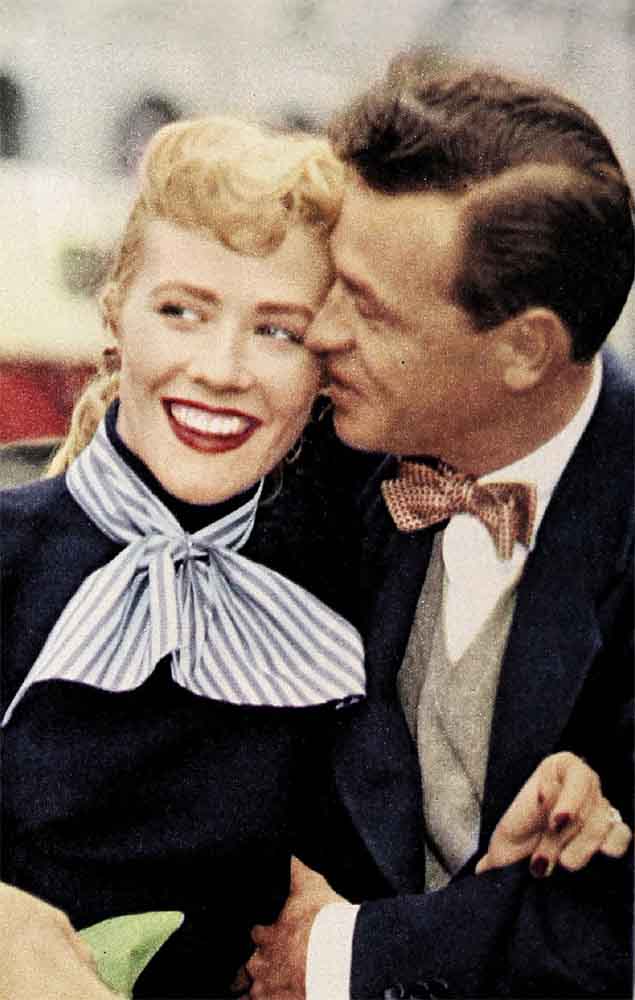
“But why didn’t you”. . . . Joyce started then stopped. What did it matter that he hadn’t given his name? He was there, wasn’t he? She just kissed him. Whereupon they both forgot everything else.
They will be Mr. and Mrs. any day now, and Hollywood thinks Joyce will give up her career after that to be Mrs. Dok Stanford under a life contract.
Ann Blyth and Dick Clayton, at the other extreme, don’t even call it love. Yet what is it, when they have been each other’s dearest friend for fourteen years, ever since Ann was a tiny seven-year-old in a professional children’s school in New York—and Dick a student there, too, just a little older?
All the important events of each other’s lives they share. As, for instance, when Dick recently decided not to be an actor any longer, but to become a top agent, Arm’s agent, incidentally.
Dick took his top agency job on February fourteenth, the day all lovers know. Dick and Ann made it a Valentine party when she wore a wonderful red dress and he sent her golden roses. They went to the Beverly Hills hotel to dine and dance, for Ann is the kind of quiet girl who doesn’t give a snap of her fingers for spots like Mocambo or Ciro’s. At midnight, they toasted each other and Dick’s future.
In the same way, when Ann flew to Honolulu late this spring for her first vacation in four years, it was Dick who saw her off. He had her tickets, and her seat reservation. He also had arranged for her to be met at the other end by a friend, so that among all the public hubbub she would feel protected He was full of good, sound advice to her as to how and where she should rest, and when she decided to come back by boat, he arranged all that, also.
“As a date,” Dick says, “Ann conveys the most flattering impression any girl can give—that the man, not she, is the bigshot. With Ann, listening really is an art. She seems fascinated by your every word. When she dances, which she does divinely, she is not looking around at everyone else on the floor, nor commenting on other women’s clothes, and she sever table-hops.
“She’s aware, too, that even though a man asks her out, he may still be tired from a hard day and she often wants to do very simple things. One of the nicest of these is her cooking dinner for you. She’s a wonderful cook and her fried chicken and brownies make a combination that are out of this world as far as I am concerned. We both love horseback riding and Ann delights in finding unusual trails, sometimes high up in the mountains above the sea, where you can catch a view it would be impossible to find by any other means. She likes simple beach dates, too; in fact, all her tastes run to simplicity.
“And she’s kind. I have never heard her make a cruel or coarse reference to anyone. She works very hard and is naturally ambitious, but she never crowds, she never pushes, she couldn’t possibly hurt anyone.”
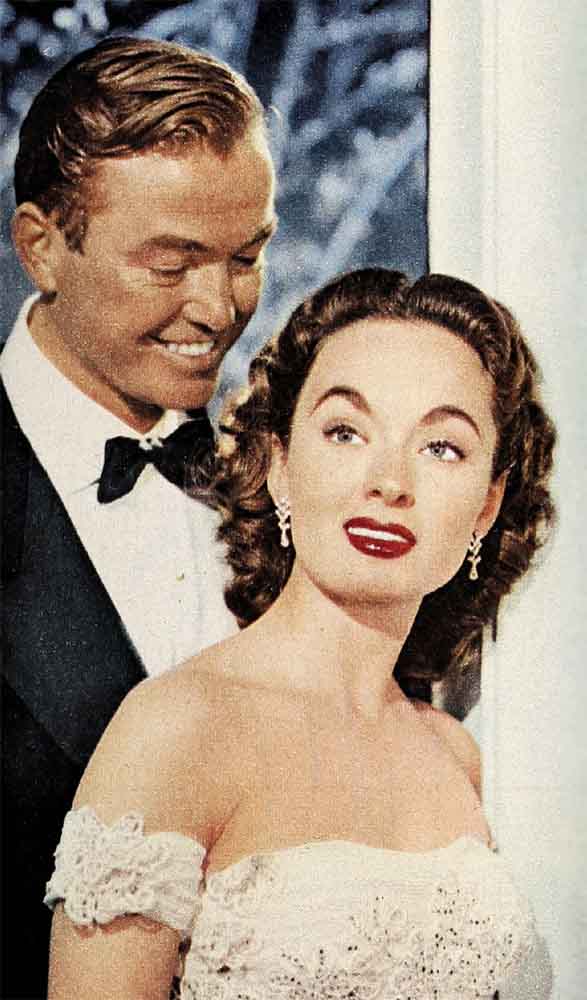
Yet they don’t say they are in love, Ann and Dick. But like the girl next door with the boy whom she’s known all her life, nothing would surprise Hollywood less if these two drifted into marriage—and lived blissfully ever after.
Anne Francis was engaged to a Dartmouth boy when she first met Bam Price, a UCLA man himself. Now Anne isn’t engaged to the Dartmouth boy any longer and if you can’t see that in between there lies Cupid at work, why, you don’t know about this season.
To create young love like Anne’s and Bam’s you mix one tall, willowy blonde, aged just about twenty, with one thoroughly nice male, about three years older. You have them both come from very nice families in small cities (like Anne’s Glens Falls, N Y.) and both develop the same love of the theatre—for no reason that either of them knows. You have them meet, entirely by accident, at a little teatre production in Hollywood, be quite properly introduced—and mighty, mighty impressed on both sides, and then Mr. Price asks Miss Francis for a date and she says she’d be delighted and would he ke to call around—well, next Tuesday, maybe? He says, yes, indeed he would, and could he take her for dinner, at seven? And say, what’s the address? She gives it to him and he stares.
“But this is fantastic,” he says and he gives her his address—and she stares, hey live, oh, dear, blind Cupid, practially next door to each other.
That’s enough for love, when you’re young and the girl is beautiful and the boy is handsome and they’re both smart, Enough to start with, anyhow, and that’s how Anne and Bam started.
But many a boy and girl start out on dates and then something fades and they see each other no more. So here, for your personal test-o-meter is the score on Anne as Bam sees her—through the rosiest-colored glasses a happy young man ever wore.
“With Anne there’s never a dull moment,” Bam says. “We like just the same people, just the same things. I am taking the course in motion picture technique at UCLA, not to become an actor, but to get into the production or directing end of the business. Anne has been acting all her life, yet there is never a bored moment in her approach toward acting, play producing, writing or even scenic designing. She wants to know everything and anything about show business and is incredibly tolerant with all the things I have yet to learn.
“I admire her for being the true modern girl, who earns her living, lives alone, is completely independent and still utterly feminine. She knows when to talk and when to listen. The way her mind works is illustrated by our two conversations about chinchillas. I brought up the economic aspect of these little animals one day. I’d been reading how a pair of them could set a man up in business. I asked Anne what she thought of the idea. She said she’d like time to think it over.
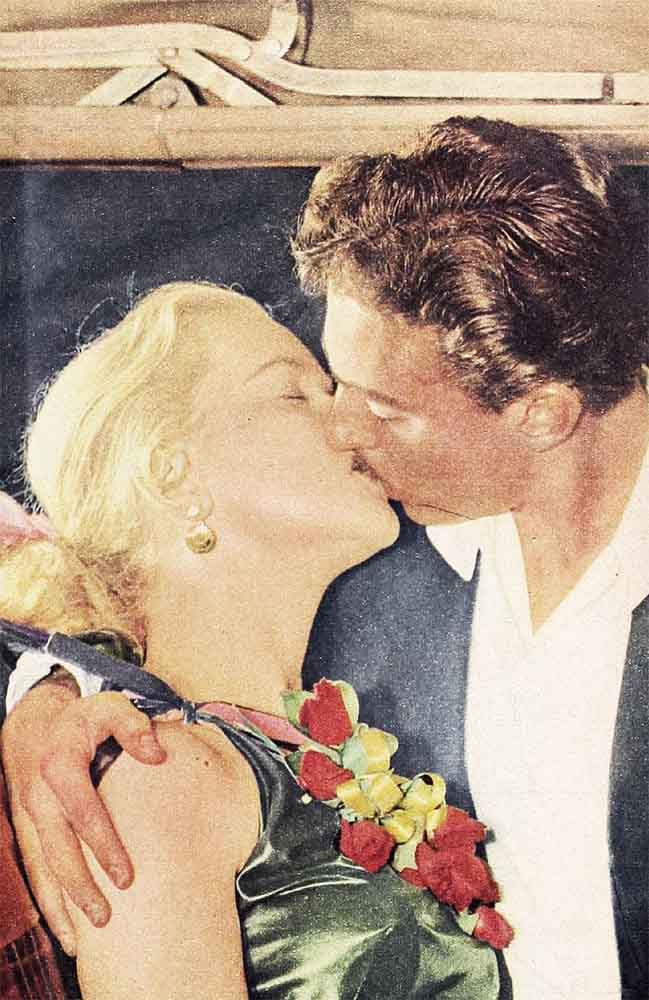
“The next evening she called me and I can only conclude she had spent all the day preceding her call in the library—or on a chinchilla farm. For there wasn’t a thing she didn’t know about them—how to raise them, feed them, breed them, and merchandise them.
“Don’t ever believe that old, old line that a man likes his girl beautiful but dumb. When she is beautiful and brilliant, that’s the real charge.
“Anne rates for humor and sweetness, too. I have an old crate of a car on which I was forever letting the battery run down. Anne had warned me about it a couple of times—but recently we went down to visit some friends at Malibu and when we started home, around one in the morning, there was the battery, dead as a silent picture. I braced myself for the line, ‘I told you so’ but all I heard was Anne’s giggle. ‘The walk will do us good,’ she laughed.
“I was too embarrassed to go back in to our friends. ‘Game to hike down to that public phone booth we passed about half a mile back?’ I asked. ‘Sure,’ said Anne.
“We hiked and woke up the auto club man—thereby making him love us. But he did come out, only unfortunately there was nothing he could do to revive that battery. ‘You could call a cab,’ he said, as our watches showed 2 a.m.
“I looked at Anne and trust that smartie to get it. Those California distances! She giggled again. ‘How much money have you got?’
“I dug down, came up with four bucks, when I’d counted all the small change. She giggled again and emptied her purse—three dollars and twenty-one cents she had. Pooled, that actually left us enough for a tip for the cab driver when he pulled up in front of Anne’s apartment building, as the tower clock near the University tolled three.
“ ‘Oh, Bam, it’s been such fun,’ she said. That’s all! But next morning, friends, I went and bought a brand new battery.”
Since Bam is still in college and Anne is just getting going on her career, they have not made too definite future plans. But judging by what happened to the Dartmouth deal. . . .
Sweet are the uses of publicity, if you ask Dick Anderson. It was publicity and nothing else, you see, that made him go to a fashion show late last summer. It seemed somebody wanted a guy’s idea on what the well-dressed doll should wear.
He loathed the idea until he sat down next to Piper Laurie. The fashion show was held at the Bel-Air hotel, than which there is no more beautiful setting. The models, wearing the clothes, were really dishes and stacked. The day couldn’t have been sunnier. But it all faded into nothingness when Dick saw Piper.
Only he didn’t get a chance to say a word because the show had started. But he did smile and she smiled back. He hoped to find a little time when the show was over and he did, to the extent of saying, “May I introduce myself. I’m Dick Anderson.”
Pretty Piper dimpled. “As if you need to tell me I’m Piper Laurie.”
“Oh, I know, I know. But I don’t know your phone—”
Exactly at that moment a publicity man from Piper’s studio, U-I, swooped down on her. And exactly at that moment a publicity man from M-G-M swooped down on Dick. From opposite ends of the room, they were suddenly looking at each other. And by the time Dick was free again. Piper had gone.
Three days later, having obtained her phone number, he called her. But besides being a very busy young actress, Piper also is a very popular girl. She wasn’t free the night Dick wanted to date her, nor the second time, nor the third. He was a little annoyed. This was a new deal to him. He was used to having the pursuit coming his way, not vice versa.
The holidays came and passed and then, one night in late January, Dick’s phone rang. “Would you like to go to the Photoplay Gold Medal dinner with me?” Piper asked. “You see, I really would like a date with you.”
Would he? Would any young actor? To get to the Photoplay Gold Medal dinner, you have to be in one of the most popuuar pictures of the year—or have given one of the most popular performances—or be one of the “Choose Your Star” winners, like Piper.
Dick was shyer than he ever had believed he could be, as he arrived at the simple little house where Piper lives with her parents. But they are such homey folks he was immediately at his ease—but when Piper appeared in her formal gown, he I was knocked happy and breathless again. He held out a corsage of gardenias toward her. “If I bore you this evening, at least you can have some fun eating these,” he said, referring to that old publicity yarn that had Piper nibbling at a flower-petal salad.
Now that they’ve had a flock of wonderful dates, Dick knows what a good sport Piper was when she laughed at his wit. For actually, she hated that publicity stunt. The minute she got big enough around U-I to assert any independence, she asked them to omit flowers—and they did. But on the occasion of the Photoplay Gold Medal dinner, she let Dick think he was such a bright character to mention it!
Dick says of her, “We both love to eat and talk and when we’re together we do both constantly. Piper is easy to be with. You don’t have to watch your step all the time or weigh every word you say. We both love movies, see every picture in town. One night when we had a date we saw four feature films at two theatres.
“I admire Piper, because without being the least bit namby-pamby, she obeys her parents. She’s intelligent. She grew up in the war years so she knows life can be tough, but she’s not hard or overly sophisticated. She’s ready to learn from anyone. She likes all sorts of people and she’s the worst pushover for animals! Lately, when her dog had pups, she acted as though it were the most serious event, requiring her full concentration. That’s the little girl in her, but the big, brave girl in her was shown when she went close to the front in Korea. I guess what makes her so much fun is the combination of those two qualities—her ability to face anything she must, and at the same time to react to everything with zest.
Since Piper is barely twenty, her folks think she is too young to think about marriage. “The only future we dare hope for right now is that we’ll get a chance to do a comedy together,” Dick says, discreetly. In words, that is. The light in his eye, however, is a real gleam that will bear watching.
So there they are. four young Hollywood love stories, all different, yet in one way all the same, because in each one the girl is charming and a good sport, with a sense of humor and intelligence; above all, an alert and modern girl—who makes the man feel, as men always want to feel, that they are dreams.
All of which, Cupid will tell you, is a winning ticket anywhere.
(Piper Laurie is in “Has Anybody Seen My Gal?”; Richard Anderson in “Scara-mouche”; Joyce Holden in “Bronco Buster;’’ Ann Blyth in “Sally and St. Ann” and “The World in His Arms”; Anne Francis in “Lydia Bailey”)
THE END
It is a quote. PHOTOPLAY MAGAZINE JULY 1952



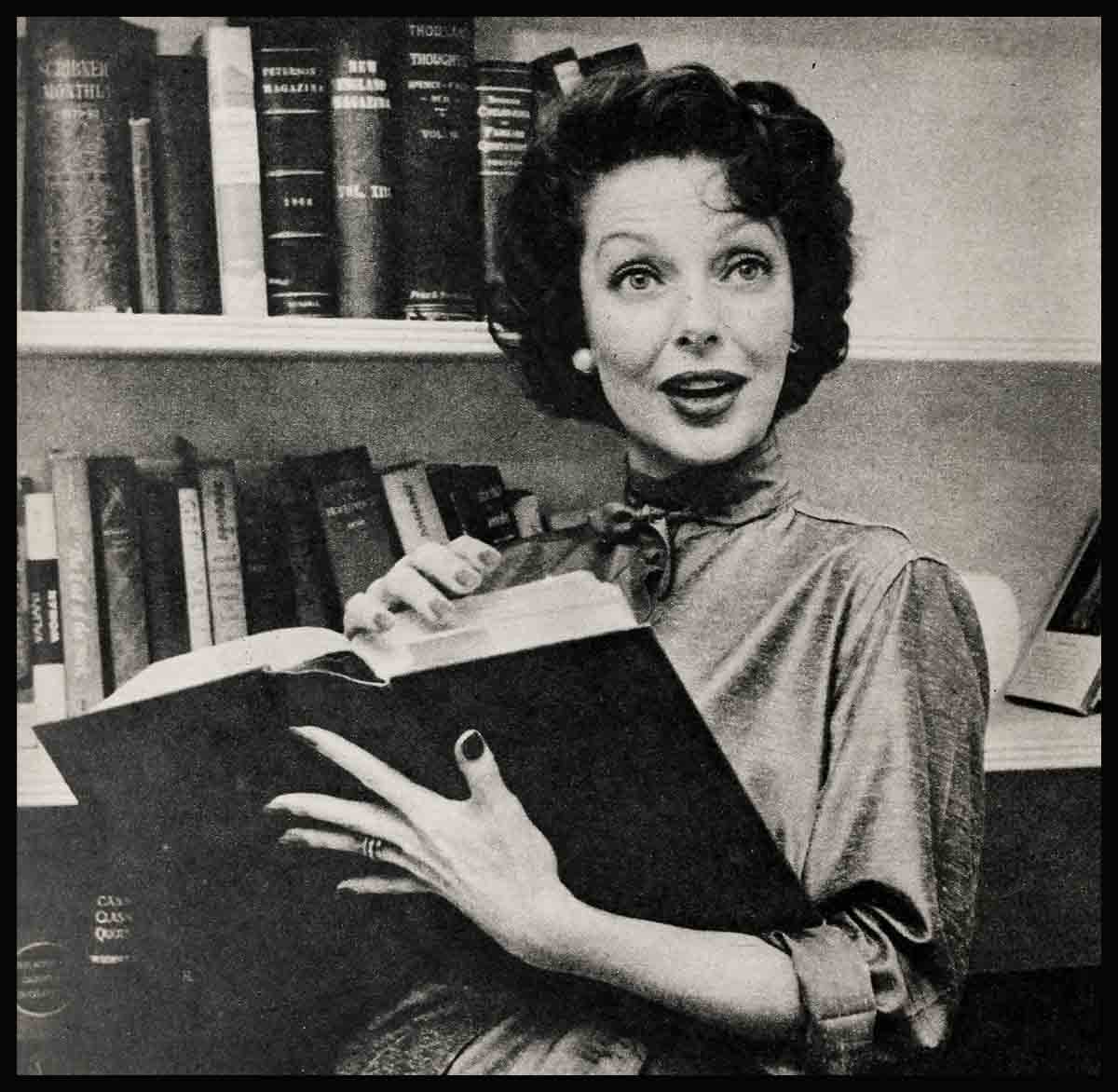
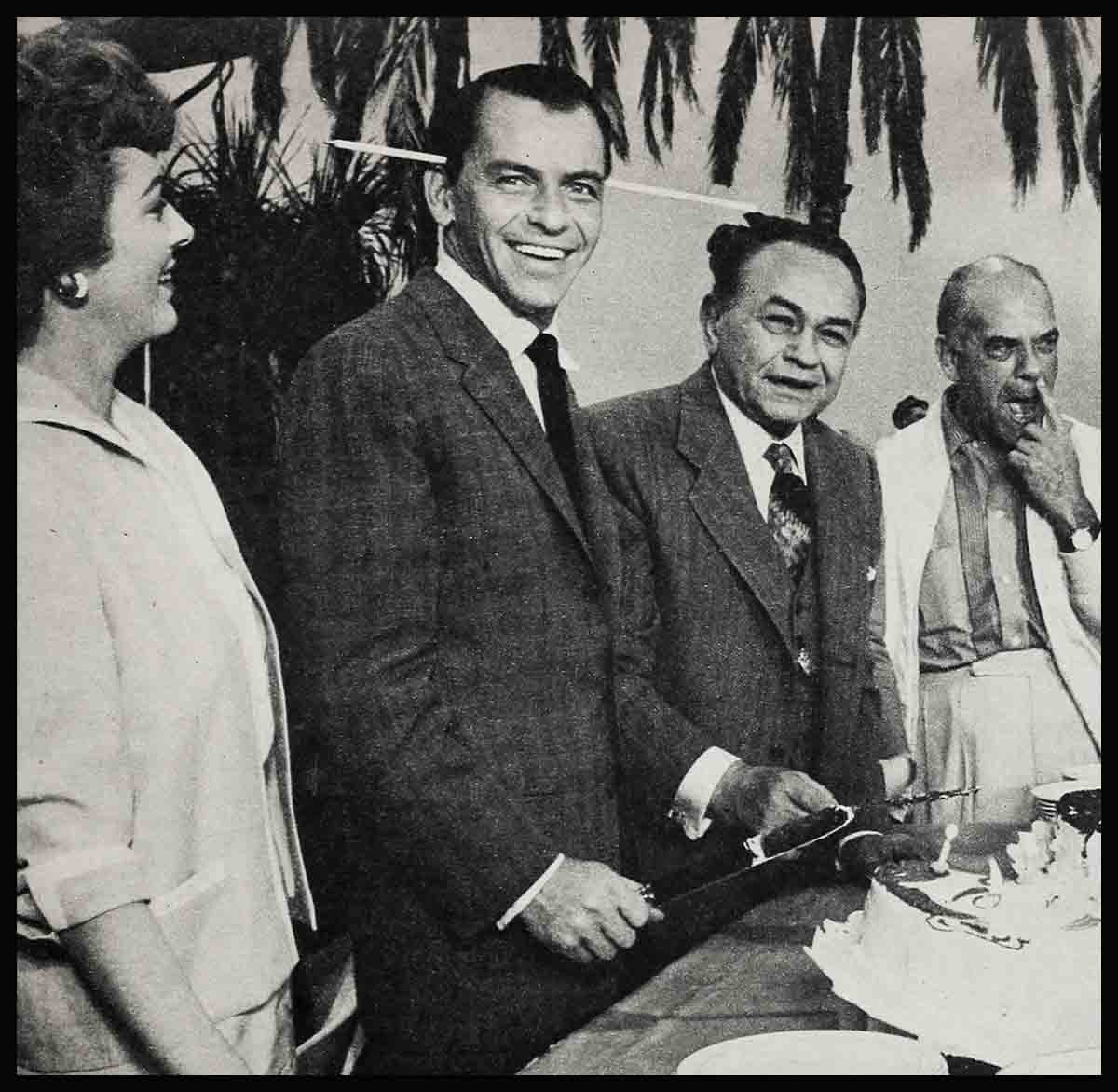
zoritoler imol
3 Ağustos 2023Hello! Do you use Twitter? I’d like to follow you if that would be ok. I’m undoubtedly enjoying your blog and look forward to new posts.